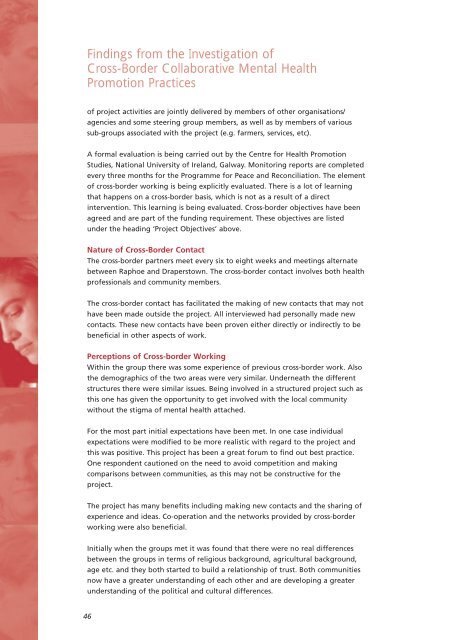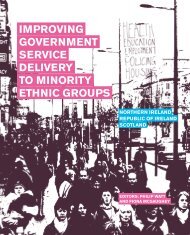4858 Mental Health Report - National University of Ireland, Galway
4858 Mental Health Report - National University of Ireland, Galway
4858 Mental Health Report - National University of Ireland, Galway
Create successful ePaper yourself
Turn your PDF publications into a flip-book with our unique Google optimized e-Paper software.
Findings from the Investigation <strong>of</strong><br />
Cross-Border Collaborative <strong>Mental</strong> <strong>Health</strong><br />
Promotion Practices<br />
<strong>of</strong> project activities are jointly delivered by members <strong>of</strong> other organisations/<br />
agencies and some steering group members, as well as by members <strong>of</strong> various<br />
sub-groups associated with the project (e.g. farmers, services, etc).<br />
A formal evaluation is being carried out by the Centre for <strong>Health</strong> Promotion<br />
Studies, <strong>National</strong> <strong>University</strong> <strong>of</strong> <strong>Ireland</strong>, <strong>Galway</strong>. Monitoring reports are completed<br />
every three months for the Programme for Peace and Reconciliation. The element<br />
<strong>of</strong> cross-border working is being explicitly evaluated. There is a lot <strong>of</strong> learning<br />
that happens on a cross-border basis, which is not as a result <strong>of</strong> a direct<br />
intervention. This learning is being evaluated. Cross-border objectives have been<br />
agreed and are part <strong>of</strong> the funding requirement. These objectives are listed<br />
under the heading ‘Project Objectives’ above.<br />
Nature <strong>of</strong> Cross-Border Contact<br />
The cross-border partners meet every six to eight weeks and meetings alternate<br />
between Raphoe and Draperstown. The cross-border contact involves both health<br />
pr<strong>of</strong>essionals and community members.<br />
The cross-border contact has facilitated the making <strong>of</strong> new contacts that may not<br />
have been made outside the project. All interviewed had personally made new<br />
contacts. These new contacts have been proven either directly or indirectly to be<br />
beneficial in other aspects <strong>of</strong> work.<br />
Perceptions <strong>of</strong> Cross-border Working<br />
Within the group there was some experience <strong>of</strong> previous cross-border work. Also<br />
the demographics <strong>of</strong> the two areas were very similar. Underneath the different<br />
structures there were similar issues. Being involved in a structured project such as<br />
this one has given the opportunity to get involved with the local community<br />
without the stigma <strong>of</strong> mental health attached.<br />
For the most part initial expectations have been met. In one case individual<br />
expectations were modified to be more realistic with regard to the project and<br />
this was positive. This project has been a great forum to find out best practice.<br />
One respondent cautioned on the need to avoid competition and making<br />
comparisons between communities, as this may not be constructive for the<br />
project.<br />
The project has many benefits including making new contacts and the sharing <strong>of</strong><br />
experience and ideas. Co-operation and the networks provided by cross-border<br />
working were also beneficial.<br />
Initially when the groups met it was found that there were no real differences<br />
between the groups in terms <strong>of</strong> religious background, agricultural background,<br />
age etc. and they both started to build a relationship <strong>of</strong> trust. Both communities<br />
now have a greater understanding <strong>of</strong> each other and are developing a greater<br />
understanding <strong>of</strong> the political and cultural differences.<br />
46
















